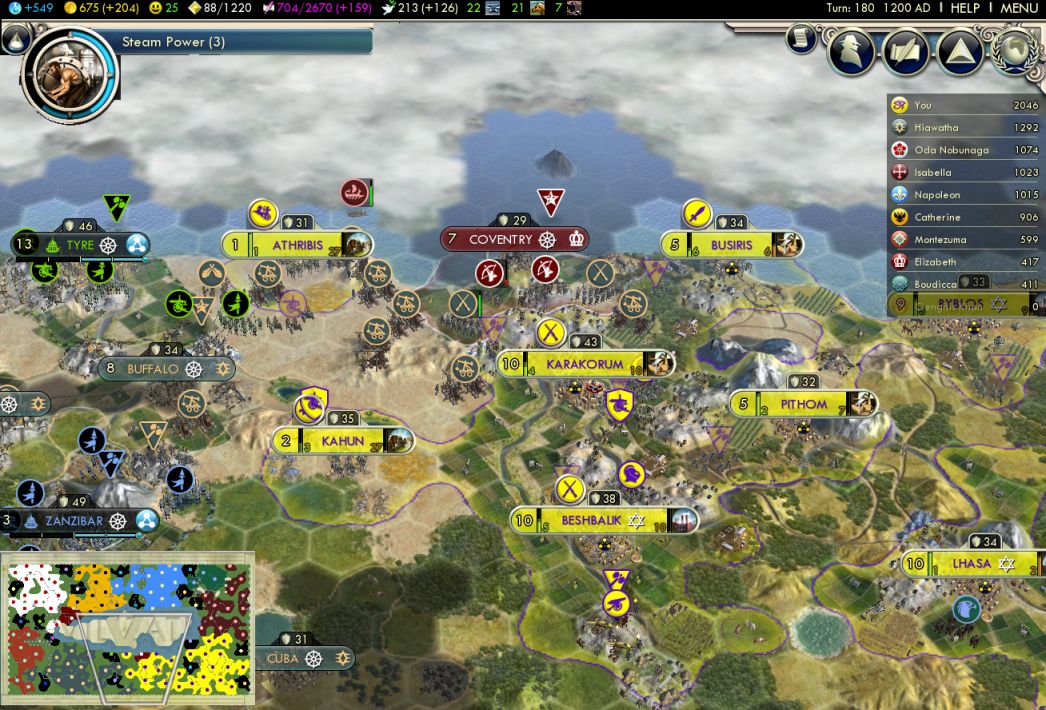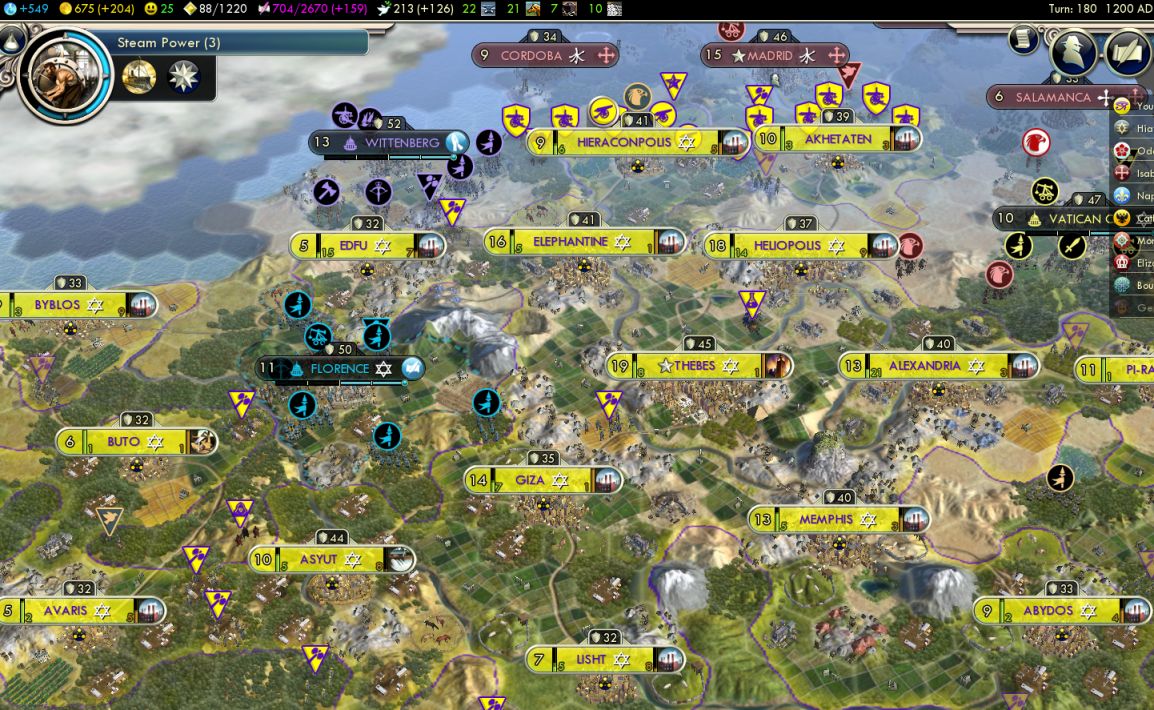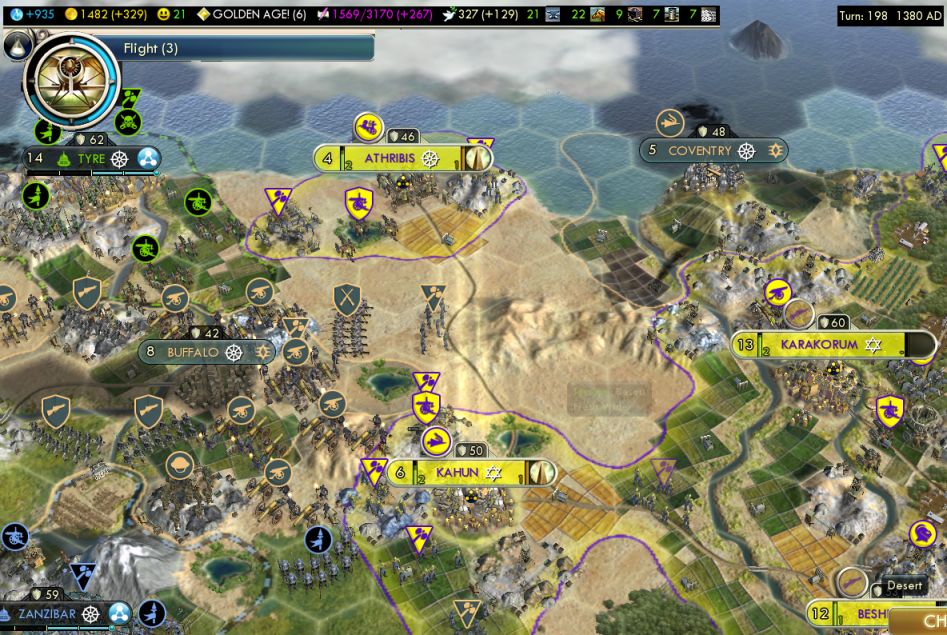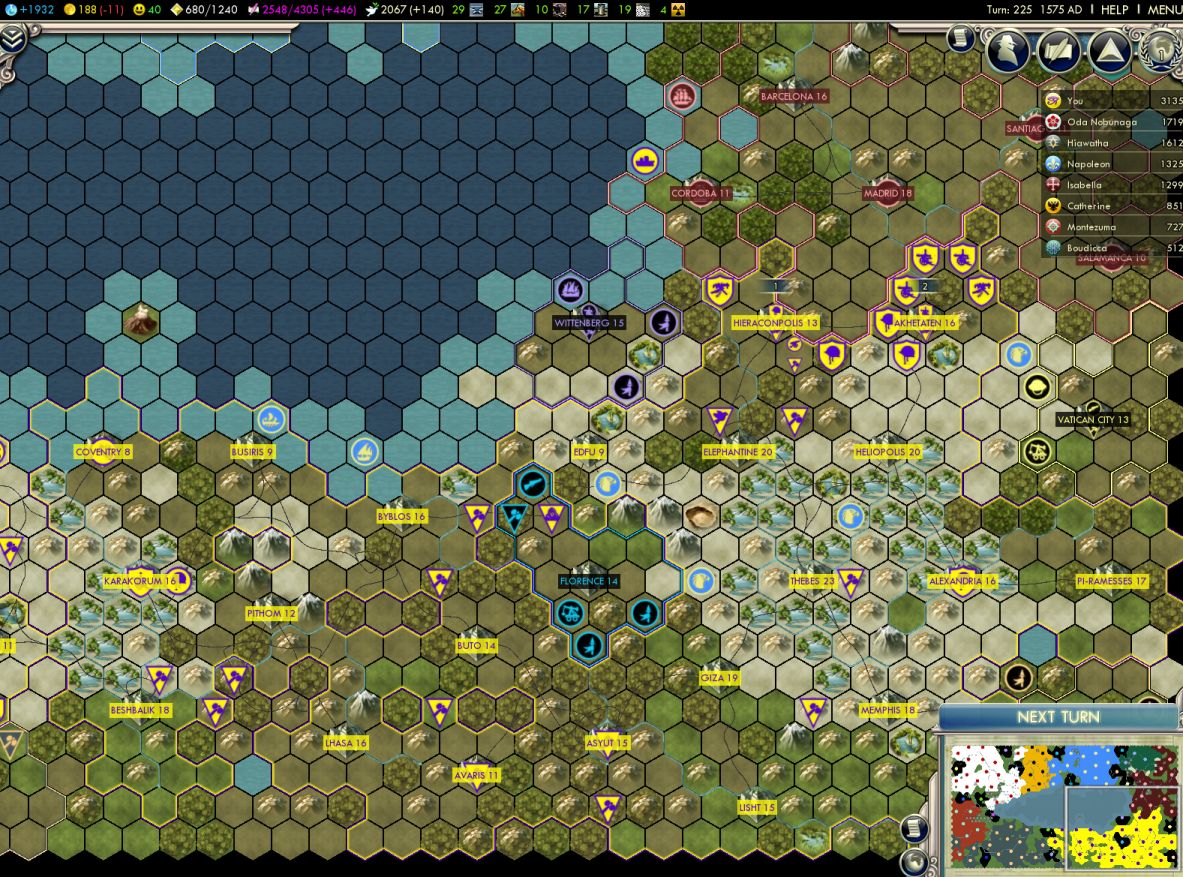 And that shot shows over 200/turn gold income. What was I doing with all that? How about 18 city-state allies. Bizarrely but not unpleasantly, there were zero militaristic CS on the whole map.
And that shot shows over 200/turn gold income. What was I doing with all that? How about 18 city-state allies. Bizarrely but not unpleasantly, there were zero militaristic CS on the whole map.I'd been waiting for that war to conclude to snap another overview, so here you go now. In two shots because Civ 5 doesn't let you zoom out far enough. (Even in the interface, it's stiff compared to Civ 4's fluidity.)


In social policies, I had finished Liberty and opened Piety but didn't want any more there in intending to switch to Rationalism for the later game. Order wasn't open yet. The only place to go was Patronage, where I always seem to wind up, and here went three policies up to Scholasticism. I guess I always wind up in Patronage thanks to how it synergizes with itself more than any other tree. The opener receives that division related mathy bonus, making your cash worth not 25% more, but 100/75 = 133% of base. That very directly synergizes with the +25% influence policy, multiplicatively making gold gifts 167% of base. So then if you have 167% as many city-state allies as otherwise, Scholasticism too is worth 167% of apparent face value.
In tech, I had to go through the military lines first to Gunpowder and Chemistry for the units to conquer Mongolia, and while there Fertilizer was of course the easy entry to the Industrial Age, just in time for my 11th policy to open Order which happened in exactly 1000 AD.
In the shot above, that's 23 cities at 1200 AD. I had just added Planned Economy next in Order, so everybody was building the half-price factories. (BTW, here's yet another ancillary-mechanic loophole. The discount on building factories does not affect the sell cost. So you could repeatedly build factories at 180 base hammers to sell for 90 gold, which is a better ratio than Wealth. Silly loophole.)
 And that shot shows over 200/turn gold income. What was I doing with all that? How about 18 city-state allies. Bizarrely but not unpleasantly, there were zero militaristic CS on the whole map.
And that shot shows over 200/turn gold income. What was I doing with all that? How about 18 city-state allies. Bizarrely but not unpleasantly, there were zero militaristic CS on the whole map.
Presently, the direction of the game changed. The plan had been to complete both Order and then Rationalism, to use all those overlapping bonuses to merrily research to a space endgame. But now the realization came that I'd never complete both, probably not even one.
This wasn't a Rationalism game, it was an Order game. Rationalism's bonuses are nice, but ultimately unnecessary compared to the power of sheer population. Why worry about +15% research when instead 15% more population could get 15% more of everything? And 18 city-state allies also says to retarget the end condition, to diplomacy rather than science.
So I continued down the middle of Order, with Socialism saving 40 gold/turn and then Communism adding over 100 hammers! Pretty nice stuff, although then there's two blank policies before you can get the finisher and in fact that never came.
Another change in Gods & Kings is that all free Great People now bump up the GP cost counter. Previously it was only free-choice great people, which meant the Liberty finisher and Hagia Sophia. Really, was that a necessary nerf? Were the Porcelain Tower and Louvre overpowered or something? What the hell Firaxis, do you just want to suck all the joy entirely out of Great People? Or maybe you want to pimp the religion system, since that's the one and only Great Person source that doesn't bump the main counter.
Yeah, like everything else in Civ 5, now Great People are dominated by "what happens to you" rather than your natural production. I produced only three natural Great People this game and seven by other means. Two of those latter were faith-purchased Great Engineers. The first did the Statue of Liberty and the second one saved for the United Nations. The Louvre artists went for Golden Ages similarly, one now and one at the end for finishing the UN. Two Great Scientists also saved for later bulbs.

Ugh. Seriously, Hiawatha? I've got Infantry (the modern kind, not even the Great War kind.) They one-shot those cannons. He even kindly warned me first with a denouncement, allowing me a few turns to finish some of those upgrade chains (musket - rifle - great war infantry - infantry takes four turns of upgrading!) I intended to abandon Athribis and defend at Kahun instead, but the AI tripped over itself enough as usual to never even crack Athribis. I held this off and captured Buffalo to force peace.

I can never resist showing off my super cities, like Thebes here blasting out the United Nations at 240 hammers/turn. Normal desert hills were up to 7 hammers in this city with Petra, Communism, and the hydro plant.

One last overview. I bulbed two Great Scientists late. In G&K, the value of a bulb is your last six turns worth of beaker production, so naturally I saved that to the endgame where beaker production ramped up the highest. They each went for more than the full cost of Ecology and Telecommunications, and then I timed Oxford University for the final tech Globalization. One Great Engineer for the UN and ten turns later for the election, it was over.

Diplomatic Victory on turn 226, 1580 AD. A nice tidy four turns faster than my vanilla ICS game.
So ICS lives, thrives, and excels in Gods & Kings. It's easy to see why. Civ 5 in its vanilla days after patch-stabilizing was balanced on the knife edge between expansion and happiness, where max ICS would require some throttling of city growth to stay out of anger. But Gods & Kings pushes that carefully balanced snowball awry. Religion can account for up to 6 happy per city, which is the difference between constricting growth at a medium size and going unfettered full-blast until the end of the game. (Remember 6 happy is more than 6 citizens thanks to Meritocracy and the Forbidden Palace. 6 / 0.85 = actually 7.06 more citizens per city.) And on top of that, considerably more global happiness is available too: all the new luxuries plus mercantile city-states can account for another 40. I had ample happy headroom all along in this game, never even pushing hard on Pagodas and Theaters which only got to about half the cities.
On one hand, it's liberating to see the happiness constraint lift so. Civilization is back to being the game of expansion that it's always been and should be. No more big empty swaths of land going unused for anger concerns. Daring to go conquering can actually be productive.
But on the other hand, now there is no predatory check on expansion. Every city no matter how crappy is worth building. This is true even if the new city ADDS NO LAND and merely cannibalizes existing tiles! It's always correct to add a new city to take advantage of the more efficient low-end costs for both food and buildings and freebies. Seriously, do you truly understand how brutal the math is for tall? Growing from size 14 to 19 takes over 1000 food, more than from size 1 to 14! And considering that a new city gets new instances of the constant food bonuses (granary, maritimes, Tradition finisher), growing a new city is literally FIVE TIMES more food efficient than growing a tall city. The restraining factor is supposed to be happiness, but that falls apart too when new cities even build happy more efficiently, getting a new 100H / 2![]() colosseum instead of a ludicrous 500H / 4
colosseum instead of a ludicrous 500H / 4![]() stadium.
stadium.
Civ 4 had the same problem but masked it well, that every crappy city would turn positive. With the midgame trade routes from Corporation tech and Free Market civic, any new city becomes positively productive almost immediately, at worst after it grows onto a few coast tiles and whips a courthouse. But these cities could be neglected in the overall picture. A 6-pop fishing village would produce a tiny fraction of the multiplicative splendor of a core city with mature towns and economic multipliers, so could be skipped with no material difference in the outcome.
But in Civ 5 G&K you must build these cities, where every village gets showered in cheap efficient goodies and rapidly maritime-mushrooms to 12 population with a 75-hammer library and represents a significant fraction of a mature city foolishly trying to pay 200 food for another growth and 300 hammers for another science multiplier. And naturally, all these identical filler cities really kill the fun factor with the micromanagement. Civ 4 was about playing the terrain, Civ 5 about ignoring the terrain and exploiting everything else.
(This isn't my main point, but even Civ 4 corporations, the ultimate per-city goodie, do turn out to be about the terrain. The best payoff from Sid's Sushi comes by virtually creating more cottage land, by replacing farms. Mining Inc works similarly, letting you replace hill mines and workshops with more cottages instead. Or either corp can permit a fishing village to better exploit a swath of coast tiles. It's generally not worthwhile to cram in a city for the sole purpose of more corporate expansion; all you get is specialists and they only just about break even against the corp's cost.)
There's even some exploration going on that a CULTURE game is best served by going as wide as possible, which of course is the opposite of how that's supposed to work. This, naturally, intrigues me very much... dot dot dot...